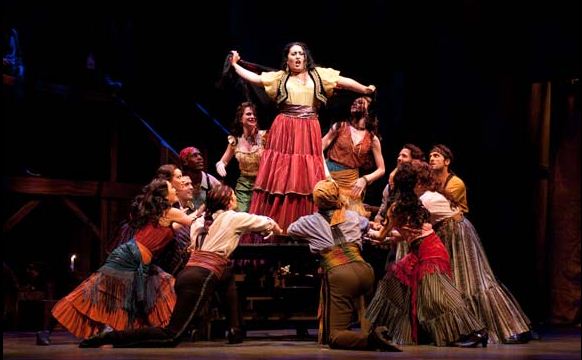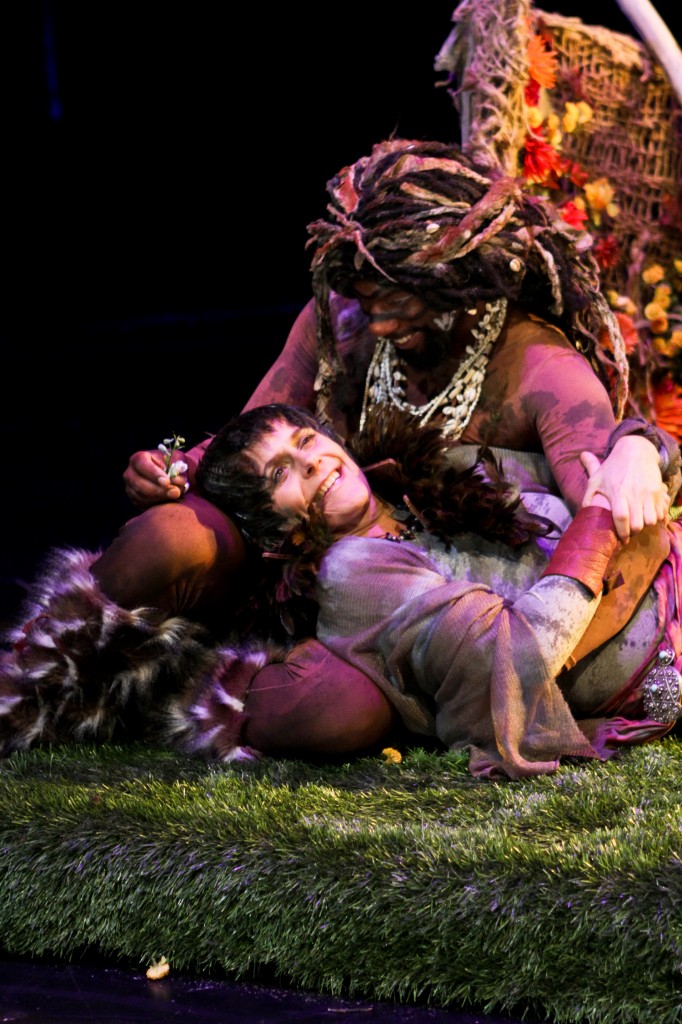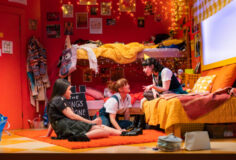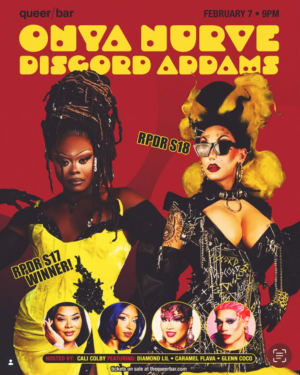I became unhinged on my last theater review for “Saving Aimee” and it swelled to 3600 words, or for you Tweeters out there, about 120 full length Tweets. “Aimee” enraged me but I’ve seen some other productions in the last week as well, and fortunately they didn’t cause me to foam at the mouth…we’ll keep this combo review as short as possible.

No, it's not Cher...it's Carmen, the original "Gypsy, Tramp, Thief" in Bizet's "Carmen" at the Seattle Opera. Photo: © Elise Bakketun/Seattle Opera
We’ll start with Seattle Opera’s current offering of Bizet’s “Carmen” the beloved opera about the feisty gypsy girl and the men she bewitches. It’s lushly produced with some spiffied up costumes from the previous production and a visiting set from Kansas City and the Gold cast features a very big name in the world of opera, mezzo-soprano Anita Rachvellishvili in the title role. Ms Rachvellishvili makes for a splendid Carmen, both poignant and fiery. In lesser hands, the role can become bitchy and trite, (Carmen is literally a mankiller, at least morally) but the diva has both excellent acting chops and a divine singing voice. Her Carmen is lusty, mercurial and in the end, resigned to her fate.
Mexican tenor Luis Chapa also shines as Don Jose, both victim and avenger of Carmen’s mercurial passion. “Carmen” is an opera with considerable amounts of spoken dialogue and a complexly subtle plot with many undercurrents to play and requires strong acting performances in addition to powerful singing voices and Mr. Chapa is up for both requirements. He does an excellent job of portraying the anguish of a man seduced and betrayed and made mad by his passion for Carmen.
The only fault I can find with this “Carmen” is with the direction by noted opera director Bernard Uzan. The production is briskly staged with some outstanding individually composed moments, but certain key moments are underplayed to the detriment of the production as a whole with the most obvious example being the famous final duet between Carmen and Don Jose and the final shocking act of the piece, the murder of Carmen. The staging of the moment was very matter of fact and a bit dull; it’s not a surprise that Don Jose kills Carmen but it should be a shocking act. The very benign end of Seattle Opera’s “Carmen” doesn’t shock; it only ended the night on a bit of a flat note. It was a disappointment in an otherwise fine production.
Let’s visit Seattle Shakespeare Company’s production of “A Midsummer Night’s Dream” after the jump…

No, this is not Katharine Hepburn in "The Lion in Winter" and a pile of macrame...it's talented actors Reginald André Jackson as Oberon and Amy Thone as Titania in Seattle Shakes' "A Midsummer Night's Dream". Photo: John Ulman
More disappointments in store: Seattle Shakespeare Company’s announcement that noted director Sheila Daniels, (a recent winner for this year’s Gregory Award for best direction) was going to take the reins for this fall’s production of Shakespeare’s very much beloved romantic, sex comedy “A Midsummer Night’s Dream” with a cast that included Amy Thone and Todd Jefferson Moore. It seemed like a match made in heaven.
Only this “Dream” is a bit of fitful slumber, an evening spent tossing and turning in an effort to gain satisfaction and pleasure from the beloved text and characters. The current production of “AMND” being staged at the Intiman, is an unfocused, unfulfilled, and uneven night of theater with an oddly contrived production design, varying shifts in tone, and some rather uneven performances. There are moments, scenes and individual performances that delight, but the other disparate notes of the production tend to overshadow the parts that give pleasure.
And, I think it all boils down to some odd decisions made in pre-production. “Dream” is cursed with a muddy and bizarre production design that either bores, or over stimulates the overall production and seems to affect every aspect of this play. (Which is very shocking because some of the best designers in Seattle theater worked on this production: Jennifer Zeyl (Costumes); Andrea Bryn Bush (Sets); Ben Zamora (Lighting)…this isn’t their strongest work.) The opening scenes set in the Athenian court of Theseus are dully played against a dull white scrim featuring some rather dull performances by actors wearing very dull costumes bathed in very flat light. We then move to the Fairy World of the Athenian Woods and into the opposite direction with ridiculously over the top costumes, a manic set that still manages to be dull, and performances that veer all over the map. The Fairies in these woods most closely resemble some renegade members from a road company of “Cats” wearing costumes salvaged from some adaptation of “Lord of the Flies”. A majority of the cast rapidly recite their lines without much inflection or meaning in an effort to “just get through it” and even if you’ve read the play or seen other productions, you could likely get lost in the jumble. It also doesn’t help that the show is oddly paced with scenes that drag and others that fly and even some of the energetic scenes lose steam before completion.
Another stunt that doesn’t really end up working very well, is the casting and the re-gendering of the role of Lysander who has been feminized into a lesbian Lysandra and played by Christine Marie Brown. It’s a cute idea, having three of the four young lovers played by women and pairing two of them up as a couple, but it doesn’t really work very well due to some miscasting. Ms Brown is a talented young actress, but physically they went the wrong way with this and the quartet in general. (Also, Ms Brown doesn’t seem very comfortable with the role.) I’m guessing that Ms Daniels wanted to cast the quartet in an unorthodox manner, at odds with the traditional casting of four pretty, young nubile actors in the roles. In addition to Ms Brown as the re-sexed Lysander, the quartet also features the tall and slightly crane like charms of Trick Danneker as the only male, Demetrius; an attractive actress of color, Allison Strickland as Hermia, and the also gawky and very comedic charms of Terri Weagant as Helena, one of the chief assets of this production. I think it’s a clever and novel idea and it might have worked but I don’t think they went far enough. Personally, I would have cast the boyishly androgynous Rhonda J. Soikowski (most recently seen as Beebo Brinker at Re-bar) as “Lysandra” and the very funny Rebecca M. Davis as Hermia. The physical contrasts between the four would have been more apparent, thus funnier, and also made a very powerful point: not all young lovers are white, traditionally “pretty”/”handsome”, or height/weight proportionate. They sort of get this point across but like much of the production, it’s an unevenly executed concept.
There were things that charmed. The “Mechanicals” the oafish laborers rehearsing a play featuring Nick Bottom, is one of the chief delights of “Dream” and they also manage to please in this production largely due to the talents of Todd Jefferson Moore as the over acting Bottom with some delightful assistance from Riley Neldam, Gordon Carpenter and Kevin McKeon. Amy Thone’s Queen Titania and Reginald André Jackson’s King Oberon had strong moments as the warring fairy couple, but they also had some flat ones as well and both were hampered with hideously unflattering costumes; Ms Thone looked like an aged actress attempting to disguise her advancing years (which is ridiculous…she’s my age!) and poor Mr. Jackson was trapped in a body stocking and enough macrame to dress a 1970’s fern bar. And, the audience seemed to like veteran Seattle Shakes actor Chris Ensweiler’s interpretation of Puck; I did not. It was an over the top, scene chewing fright that did boost the energy levels for this production, but for me, was an oddly inappropriate take on the character. Puck is mischievous not a psychotic puppet from Jim Henson’s “The Dark Crystal”.
Seattle Shakes had a brilliant season last year: one masterpiece (John Langs’s “Hamlet”); two solidly interesting shows with strong direction and acting, (“Wittenberg” and “Chamber Cymbeline”); a noble attempt at something different that didn’t quite work, (Brecht’s “The Threepenny Opera”) and one middle of the road production (The Merry Wives of Windsor”). This “Dream” is not a good start for their 21st season but things can only get better…right?
And, two reviews and I kept it UNDER 1500 words…I’m so very proud of myself.















